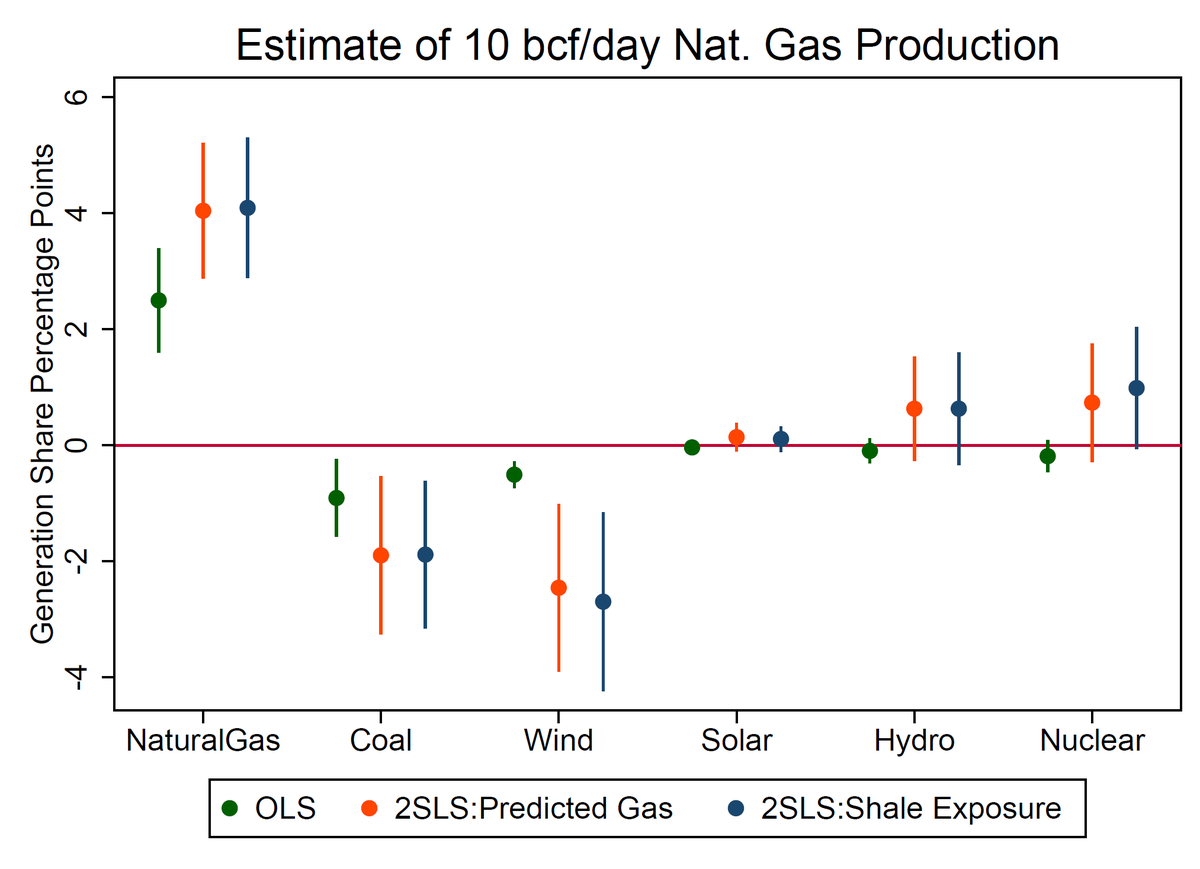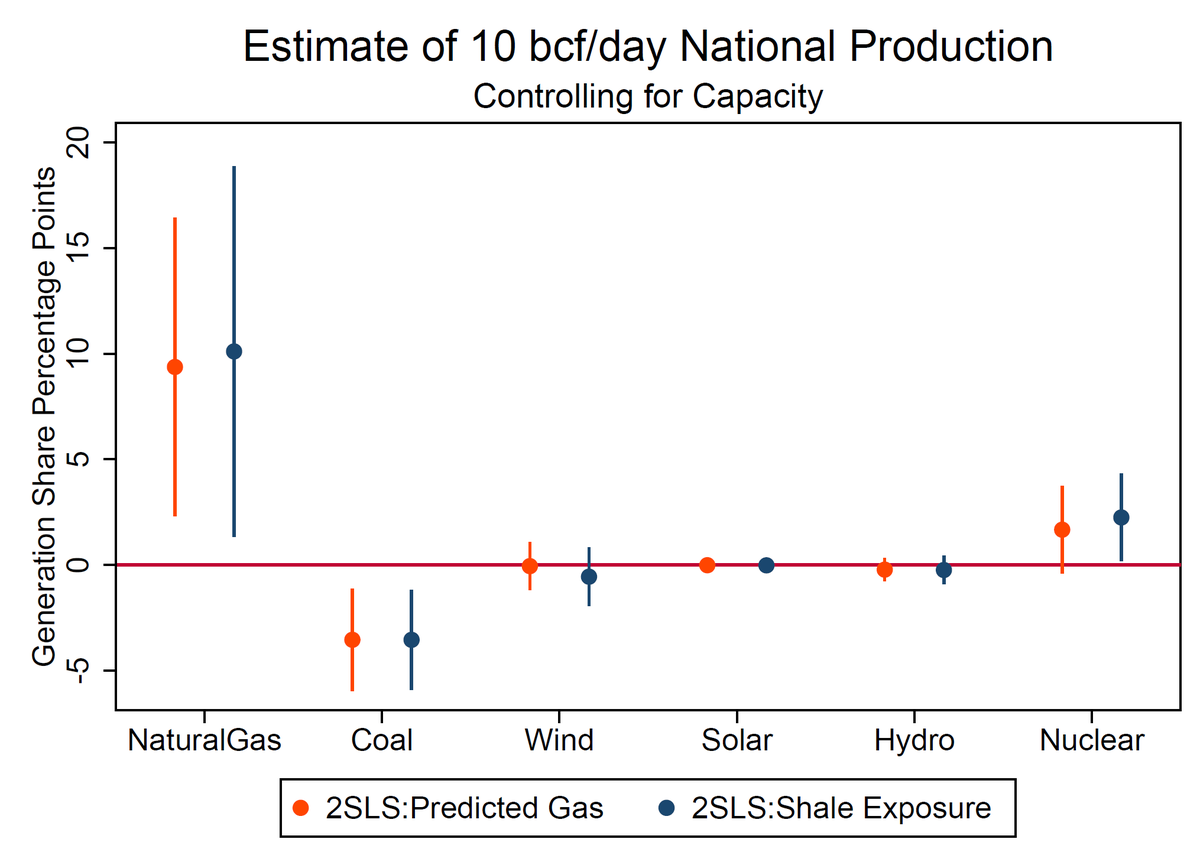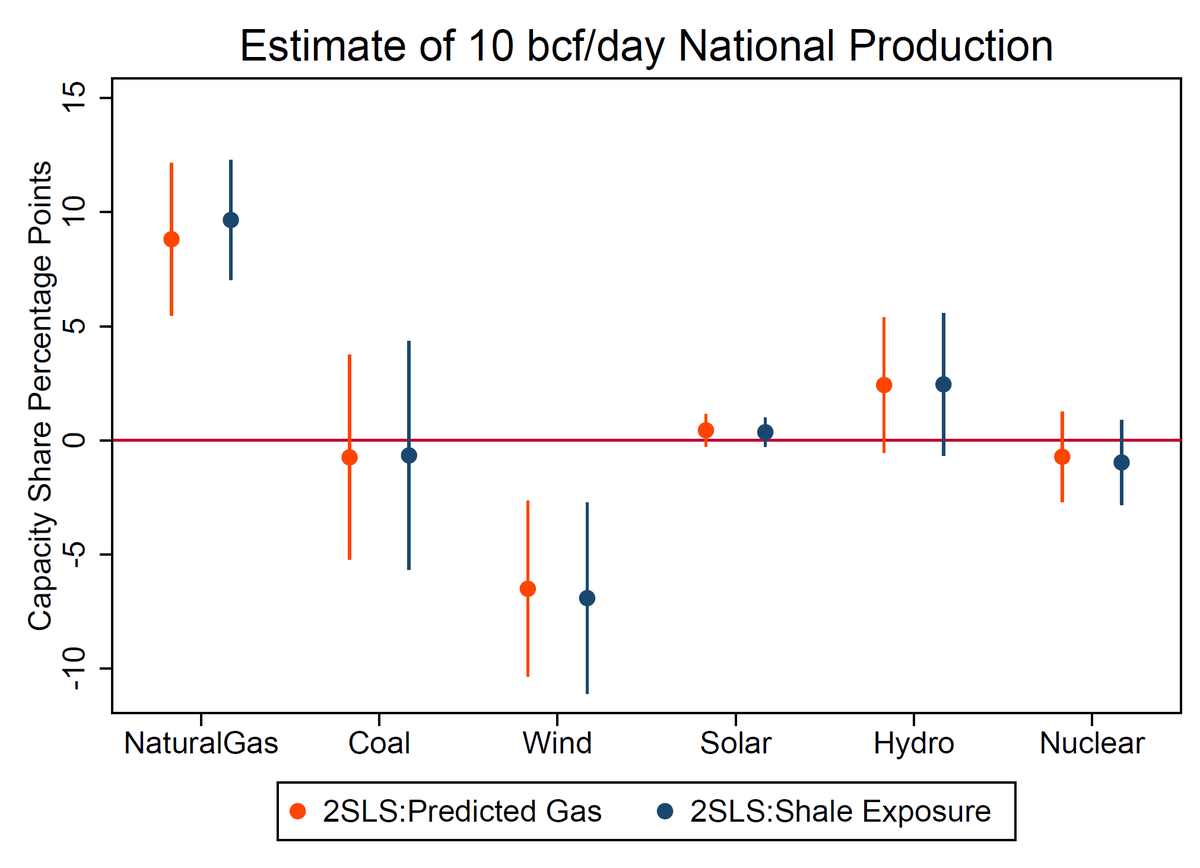Abundant natural gas from the Shale Revolution transformed the electric power sector. No doubt.
But, how much did abundant natural gas..
- displace coal?
- crowd-out investment in renewables?
- reduce CO2 emissions?
PAPER THREAD
Written w/Jonathan Scott
This addresses a contentious issue:
- is NG production good or bad for https://abs.twimg.com/emoji/v2/... draggable="false" alt="⬇️" title="Downwards arrow" aria-label="Emoji: Downwards arrow"> CO2?
https://abs.twimg.com/emoji/v2/... draggable="false" alt="⬇️" title="Downwards arrow" aria-label="Emoji: Downwards arrow"> CO2?
On one side, the US EIA points to "coal-to-gas" switching as the number on contributor to CO2& #39;s decline since 2005.
On the other, a presidential front runner wants to effectively ban NG production.
- is NG production good or bad for
On one side, the US EIA points to "coal-to-gas" switching as the number on contributor to CO2& #39;s decline since 2005.
On the other, a presidential front runner wants to effectively ban NG production.
We answer this question using a novel empirical strategy.
Using the legacy interstate natgas pipeline network, from 1990, we identify which states were quasi-randomly more exposed to abundant natural gas from the Shale Revolution.
(Thank my co-author Jonathan Scott for this!)
Using the legacy interstate natgas pipeline network, from 1990, we identify which states were quasi-randomly more exposed to abundant natural gas from the Shale Revolution.
(Thank my co-author Jonathan Scott for this!)
So we separately estimate how more (plausibly exogenous) NG deliveries changes the share of electricity generated by different fuels.
We find https://abs.twimg.com/emoji/v2/... draggable="false" alt="⬆️" title="Upwards arrow" aria-label="Emoji: Upwards arrow"> NG by 10 bcf/day
https://abs.twimg.com/emoji/v2/... draggable="false" alt="⬆️" title="Upwards arrow" aria-label="Emoji: Upwards arrow"> NG by 10 bcf/day
- https://abs.twimg.com/emoji/v2/... draggable="false" alt="⬆️" title="Upwards arrow" aria-label="Emoji: Upwards arrow">NG electricity share by 4 %
https://abs.twimg.com/emoji/v2/... draggable="false" alt="⬆️" title="Upwards arrow" aria-label="Emoji: Upwards arrow">NG electricity share by 4 %
- https://abs.twimg.com/emoji/v2/... draggable="false" alt="⬇️" title="Downwards arrow" aria-label="Emoji: Downwards arrow">Coal and Wind electricity share by ~2% each
https://abs.twimg.com/emoji/v2/... draggable="false" alt="⬇️" title="Downwards arrow" aria-label="Emoji: Downwards arrow">Coal and Wind electricity share by ~2% each
We find
-
-
(aside)
We find the effect on coal is in the short-run, by conditioning on fuel-specific generation capacity.
And the effect on wind turbines is in the long-run, only having an impact on install capacity.
We find the effect on coal is in the short-run, by conditioning on fuel-specific generation capacity.
And the effect on wind turbines is in the long-run, only having an impact on install capacity.
With these estimate we present a counterfactual:
What would the energy mix look like if the Shale Revolution never happened?
We would see less gas, more coal, & more wind!
Most interesting,
- Natural gas stalled the transition to renewables
- Coal declines by some regardless
What would the energy mix look like if the Shale Revolution never happened?
We would see less gas, more coal, & more wind!
Most interesting,
- Natural gas stalled the transition to renewables
- Coal declines by some regardless
What does this mean for CO2 emissions?
We estimate the effect of more NG deliveries on CO2 emissions, and present a counter factual.
More NG deliveries decreases CO2 . But! CO2 would have decline anyway.
So there& #39;s enivro benefits, but they& #39;re smaller than EIA suggests.
We estimate the effect of more NG deliveries on CO2 emissions, and present a counter factual.
More NG deliveries decreases CO2 . But! CO2 would have decline anyway.
So there& #39;s enivro benefits, but they& #39;re smaller than EIA suggests.
We& #39;re not done! More NG production has costs in the form of methane leakage. Methane has greater global warming potential than CO2 in the short run.
We calculate what "leakage-rate" equates the benefits of NG production ( https://abs.twimg.com/emoji/v2/... draggable="false" alt="📉" title="Chart with downwards trend" aria-label="Emoji: Chart with downwards trend">CO2) with the costs (
https://abs.twimg.com/emoji/v2/... draggable="false" alt="📉" title="Chart with downwards trend" aria-label="Emoji: Chart with downwards trend">CO2) with the costs ( https://abs.twimg.com/emoji/v2/... draggable="false" alt="📈" title="Chart with upwards trend" aria-label="Emoji: Chart with upwards trend">CH4).
https://abs.twimg.com/emoji/v2/... draggable="false" alt="📈" title="Chart with upwards trend" aria-label="Emoji: Chart with upwards trend">CH4).
We calculate what "leakage-rate" equates the benefits of NG production (
We find a leakage rate >3.3% obliterates the enviro benefits of more natural gas production.
This is smaller than tech-based estimates (5% to 9%).
Actual leakage estimates range from 1.4 to 2.3%. So NG production provides net-benefits, but there& #39;s little room for error!
This is smaller than tech-based estimates (5% to 9%).
Actual leakage estimates range from 1.4 to 2.3%. So NG production provides net-benefits, but there& #39;s little room for error!
So, yes, natural gas has some enviro benefits.
But it is important to remember:
- Natural gas & renewables are substitutes in the LR
- Directed enviro policies can achieve same (better) results (ahem, carbon tax)
- We really need to minimize methane leakage
But it is important to remember:
- Natural gas & renewables are substitutes in the LR
- Directed enviro policies can achieve same (better) results (ahem, carbon tax)
- We really need to minimize methane leakage
Thank you for coming to my Mat Talk. Paper& #39;s here: https://drive.google.com/file/d/1TSbH8T-MAtyMI1tb-CJVK1E5uSWr-lW7/view
Jonathan">https://drive.google.com/file/d/1T... Scott (my co-author) is a fantastic colleague on the Job Market this year. Check out his portfolio, interview him in San Diego, and hire him. https://www.jon-sc.in/
Enjoy">https://www.jon-sc.in/">... a picture of my cat.
Jonathan">https://drive.google.com/file/d/1T... Scott (my co-author) is a fantastic colleague on the Job Market this year. Check out his portfolio, interview him in San Diego, and hire him. https://www.jon-sc.in/
Enjoy">https://www.jon-sc.in/">... a picture of my cat.

 Read on Twitter
Read on Twitter Researchhttps://abs.twimg.com/emoji/v2/... draggable="false" alt="🚨" title="Police cars revolving light" aria-label="Emoji: Police cars revolving light">Abundant natural gas from the Shale Revolution transformed the electric power sector. No doubt. But, how much did abundant natural gas..- displace coal?- crowd-out investment in renewables?- reduce CO2 emissions?PAPER THREADWritten w/Jonathan Scott" title="https://abs.twimg.com/emoji/v2/... draggable="false" alt="🚨" title="Police cars revolving light" aria-label="Emoji: Police cars revolving light">Researchhttps://abs.twimg.com/emoji/v2/... draggable="false" alt="🚨" title="Police cars revolving light" aria-label="Emoji: Police cars revolving light">Abundant natural gas from the Shale Revolution transformed the electric power sector. No doubt. But, how much did abundant natural gas..- displace coal?- crowd-out investment in renewables?- reduce CO2 emissions?PAPER THREADWritten w/Jonathan Scott" class="img-responsive" style="max-width:100%;"/>
Researchhttps://abs.twimg.com/emoji/v2/... draggable="false" alt="🚨" title="Police cars revolving light" aria-label="Emoji: Police cars revolving light">Abundant natural gas from the Shale Revolution transformed the electric power sector. No doubt. But, how much did abundant natural gas..- displace coal?- crowd-out investment in renewables?- reduce CO2 emissions?PAPER THREADWritten w/Jonathan Scott" title="https://abs.twimg.com/emoji/v2/... draggable="false" alt="🚨" title="Police cars revolving light" aria-label="Emoji: Police cars revolving light">Researchhttps://abs.twimg.com/emoji/v2/... draggable="false" alt="🚨" title="Police cars revolving light" aria-label="Emoji: Police cars revolving light">Abundant natural gas from the Shale Revolution transformed the electric power sector. No doubt. But, how much did abundant natural gas..- displace coal?- crowd-out investment in renewables?- reduce CO2 emissions?PAPER THREADWritten w/Jonathan Scott" class="img-responsive" style="max-width:100%;"/>
 CO2?On one side, the US EIA points to "coal-to-gas" switching as the number on contributor to CO2& #39;s decline since 2005. On the other, a presidential front runner wants to effectively ban NG production." title="This addresses a contentious issue:- is NG production good or bad for https://abs.twimg.com/emoji/v2/... draggable="false" alt="⬇️" title="Downwards arrow" aria-label="Emoji: Downwards arrow"> CO2?On one side, the US EIA points to "coal-to-gas" switching as the number on contributor to CO2& #39;s decline since 2005. On the other, a presidential front runner wants to effectively ban NG production.">
CO2?On one side, the US EIA points to "coal-to-gas" switching as the number on contributor to CO2& #39;s decline since 2005. On the other, a presidential front runner wants to effectively ban NG production." title="This addresses a contentious issue:- is NG production good or bad for https://abs.twimg.com/emoji/v2/... draggable="false" alt="⬇️" title="Downwards arrow" aria-label="Emoji: Downwards arrow"> CO2?On one side, the US EIA points to "coal-to-gas" switching as the number on contributor to CO2& #39;s decline since 2005. On the other, a presidential front runner wants to effectively ban NG production.">
 CO2?On one side, the US EIA points to "coal-to-gas" switching as the number on contributor to CO2& #39;s decline since 2005. On the other, a presidential front runner wants to effectively ban NG production." title="This addresses a contentious issue:- is NG production good or bad for https://abs.twimg.com/emoji/v2/... draggable="false" alt="⬇️" title="Downwards arrow" aria-label="Emoji: Downwards arrow"> CO2?On one side, the US EIA points to "coal-to-gas" switching as the number on contributor to CO2& #39;s decline since 2005. On the other, a presidential front runner wants to effectively ban NG production.">
CO2?On one side, the US EIA points to "coal-to-gas" switching as the number on contributor to CO2& #39;s decline since 2005. On the other, a presidential front runner wants to effectively ban NG production." title="This addresses a contentious issue:- is NG production good or bad for https://abs.twimg.com/emoji/v2/... draggable="false" alt="⬇️" title="Downwards arrow" aria-label="Emoji: Downwards arrow"> CO2?On one side, the US EIA points to "coal-to-gas" switching as the number on contributor to CO2& #39;s decline since 2005. On the other, a presidential front runner wants to effectively ban NG production.">
 NG by 10 bcf/day- https://abs.twimg.com/emoji/v2/... draggable="false" alt="⬆️" title="Upwards arrow" aria-label="Emoji: Upwards arrow">NG electricity share by 4 % - https://abs.twimg.com/emoji/v2/... draggable="false" alt="⬇️" title="Downwards arrow" aria-label="Emoji: Downwards arrow">Coal and Wind electricity share by ~2% each" title="So we separately estimate how more (plausibly exogenous) NG deliveries changes the share of electricity generated by different fuels. We find https://abs.twimg.com/emoji/v2/... draggable="false" alt="⬆️" title="Upwards arrow" aria-label="Emoji: Upwards arrow"> NG by 10 bcf/day- https://abs.twimg.com/emoji/v2/... draggable="false" alt="⬆️" title="Upwards arrow" aria-label="Emoji: Upwards arrow">NG electricity share by 4 % - https://abs.twimg.com/emoji/v2/... draggable="false" alt="⬇️" title="Downwards arrow" aria-label="Emoji: Downwards arrow">Coal and Wind electricity share by ~2% each" class="img-responsive" style="max-width:100%;"/>
NG by 10 bcf/day- https://abs.twimg.com/emoji/v2/... draggable="false" alt="⬆️" title="Upwards arrow" aria-label="Emoji: Upwards arrow">NG electricity share by 4 % - https://abs.twimg.com/emoji/v2/... draggable="false" alt="⬇️" title="Downwards arrow" aria-label="Emoji: Downwards arrow">Coal and Wind electricity share by ~2% each" title="So we separately estimate how more (plausibly exogenous) NG deliveries changes the share of electricity generated by different fuels. We find https://abs.twimg.com/emoji/v2/... draggable="false" alt="⬆️" title="Upwards arrow" aria-label="Emoji: Upwards arrow"> NG by 10 bcf/day- https://abs.twimg.com/emoji/v2/... draggable="false" alt="⬆️" title="Upwards arrow" aria-label="Emoji: Upwards arrow">NG electricity share by 4 % - https://abs.twimg.com/emoji/v2/... draggable="false" alt="⬇️" title="Downwards arrow" aria-label="Emoji: Downwards arrow">Coal and Wind electricity share by ~2% each" class="img-responsive" style="max-width:100%;"/>







